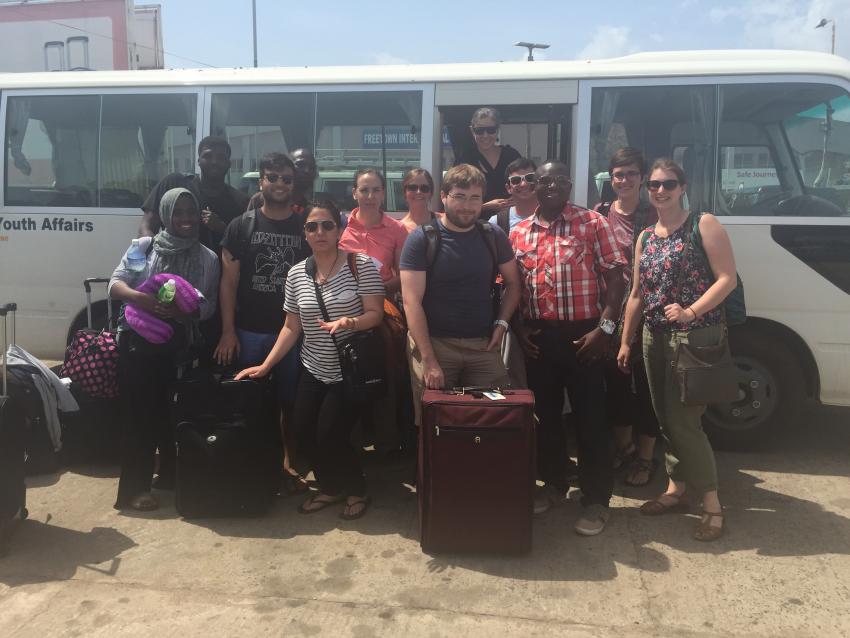IPCR Alumnus Appointed As Director General of the Sierra Leone Content Agency

Daboh ’11M with Dr. Riggan and GFS students in Sierra Leone.
Fodeba Daboh ’11M, International Peace and Conflict Resolution alumnus and adjunct professor of Historical and Political Studies, was recently appointed as Director General of the Sierra Leone Local Content Agency by His Excellency the President, Rtd Brig. Dr. Julius Maada Bio.
The Sierra Leone Local Content Agency was created in 2016 by the country’s Parliament to support the vast growth of Sierra Leone’s economy. As director general, Daboh will oversee and monitor the linkage and compliance of foreign direct investment in Sierra Leone and ensure that native people are included in the economic development plan along the value chain.
“The key to my work in this new role is to ensure indigenous Sierra Leone citizens are given first consideration and unique opportunities in terms of employment, capacity building through skills transfer and preferential margin in procurement tendering processes,” said Daboh. “Prior to now, there has been lots of reports that Sierra Leone’s economy has been growing, but it’s not translating to employment and business opportunities for in-country residents.”
A native of Sierra Leone, Daboh fled civil war in the 1990s and arrived in Pennsylvania by the early 2000s. After receiving his degree in International Relations and African Studies from the University of Pennsylvania, he attended Arcadia’s International Peace and Conflict Resolution program, where his research focused on youth unemployment and conflict in Sierra Leone. As a student, he interned with Heifer International, which focuses on ending global poverty.
“I’ve never felt the same since,” said Daboh. “I remember thinking that I can make a difference in Sierra Leone.”
Since then, Daboh has traveled between the United States and Sierra Leone to give back to his home country. After graduating from the IPCR program, he worked with the Historical and Political Studies faculty to co-lead Global Field Study (GFS) courses to Sierra Leone for students to learn about global poverty.
Dr. Jennifer Riggan, associate professor of Historical and Political Studies and co-leader of the GFS course, said the international experience is often “life changing” and many students come back with new ideas for career paths.
“It impacts many students in different degrees– several have returned to Sierra Leone or think about careers where they can go to similar places,” said Dr. Riggan. “For a lot, it shapes their career. Many students still keep in touch with people they met there.”
One of those impacted students is Kate Whitman ’18M, a graduate of the IPCR program, who is now returning to Sierra Leone in March to work with two in-country organizations on the development of a peacebuilding training for youth in Sierra Leone and America over the next few years. Using Daboh and others she met in Sierra Leone as resources, she’s able to begin the first steps of seeing her Arcadia thesis project become a reality.
“The GFS course influenced what I see as my career trajectory in the next several years,” said Whitman. “I fell in love with Sierra Leone– it’s one of my favorite places. Before I took this course, I didn’t know anything about Sierra Leone. It really opened me up to a part of the world that there are many misconceptions about.”
Both Daboh and Dr. Riggan hope that his new role will enable a stronger relationship between Arcadia University and Sierra Leone, and provide more opportunities for students to learn about global poverty while learning about the people.
“For me, poverty means people are unsure about whether they’ll get a meal,” said Daboh. “It’s people dying because they can’t get clean water, or children dying from easily preventable diseases. I’m privileged and honored to be appointed by His Excellency the president to promote the concept of local content by ensuring that indigenous Sierra Leoneans takes ownership of the economy.”


